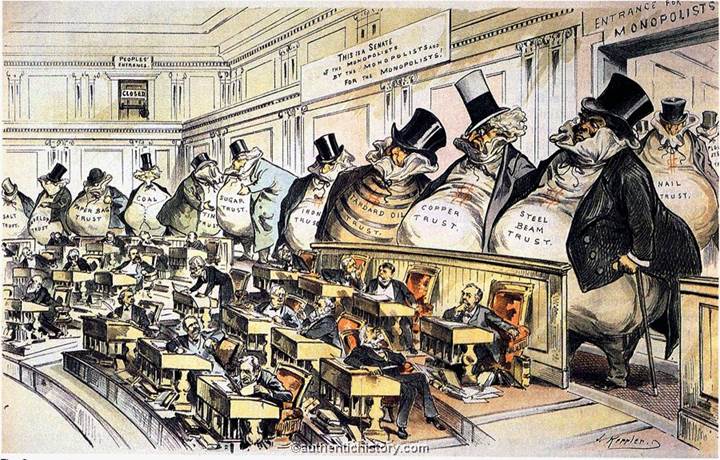It’s been a while since I read Arthur M. Schlesinger’s book The Vital Center, first published in 1949, for some undergraduate poli sci course. I dimly remember that one of his arguments is that American liberty depends on maintaining political equilibrium between the extremes of left and right. And that premise is hard-wired conventional wisdom today.
But what did Schlesinger identify as the “center”? I’d like to quote extensively from his foreword:
I was born in 1917. I heard Franklin Roosevelt’s first inaugural address as a boy at school, fifteen years old. Since that March day in 1933, one has been able to feel that liberal ideas had access to power in the United States, that liberal purposes, in general, were dominating our national policy. For one’s own generation, then, American liberalism has had a positive and confident ring. It has stood for responsibility and for achievement, not for frustration and sentimentalism; it has been the instrument of social change, not of private neurosis. During most of my political consciousness this has been a New Deal country. I expect that it will continue to be a New Deal country.
The experience of growing up under the New Deal meant too that Communism shone for few of one’s generation with the same unearthly radiance that it apparently shone for other young men a decade earlier. It was partly the fact that we did not need so desperately to believe in the Soviet utopia. Franklin Roosevelt was showing that democracy was capable of taking care of its own; the New Deal was filling the vacuum of faith which we had inherited from the cynicism and complacency of the twenties, and from the breadlines of the early thirties. Partly too the Soviet Union itself was no longer the bright dream of the twenties–the land of hope encircled by capitalist aggressors and traduced by newspapermen sending lies out of Riga. What we saw in the Russia of the thirties was a land where industrialization was underwritten by mass starvation, where delusions of political infallibility led to the brutal extermination of dissent, and where the execution of heroes of the revolution testified to some deep inner contradiction in the system. This conclusion was not, for most of us, a process of disillusionment for which we had to pay the psychological price of a new extremism. We were simply the children of a new atmosphere: history had spared us any emotional involvement in the Soviet mirage.
The degeneration of the Soviet Union taught us a useful lesson, however. It broke the bubble of the false optimism of the nineteenth century. Official liberalism had long been almost inextricably identified with a picture of man as perfectible, as endowed with sufficient wisdom and selflessness to endure power and to use it infallibly for the general good. The Soviet experience, on top of the rise of fascism, reminded my generation rather forcibly that man was, indeed, imperfect, and that the corruptions of power could unleash great evil in the world. We discovered a new dimension of experience – the dimension of anxiety, guilt and corruption. (Or it may well be, as Reinhold Niebuhr has brilliantly suggested, that we were simply rediscovering ancient truths which we should never have forgotten.)
Mid-twentieth-century liberalism, I believe, has thus been fundamentally reshaped by the hope of the New Deal, by the exposure of the Soviet Union, and by the deepening of our knowledge of man. The consequence of this historical re-education has been an unconditional rejection of totalitarianism and a reassertion of the ultimate integrity of the individual. This awakening constitutes the unique experience and fundamental faith of contemporary liberalism.
So the Vital Center Schlesinger spoke of was, bascially, New Deal liberalism. New Deal liberalism in 1949 was the perspective that it was a vital role of government to regulate the economy to promote broad economic fairness and protections from economic downturns and other misfortunes that were not people’s fault. In particular, workers, farmers, the elderly, and other vulnerable populations required protections from deprivation. In the 1960s this idea expanded into the belief that it is the proper role of the federal government to protect U.S. citizens from all forms of discrimination, including discrimination enacted into law by state and local governments.
This faith has been and will continue to be under attack from the far right and the far left. In this book I have deliberately given more space to the problem of protecting the liberal faith from Communism than from reaction, not because reaction is the lesser threat, but because it is the enemy we know, whose features are clearly delineated for us, against whom our efforts have always been oriented. It is perhaps our very absorption in this age-old foe which has made us fatally slow to recognize the danger on what we carelessly thought was our left–forgetting in our enthusiasm that the totalitarian left and the totalitarian right meet at last on the murky grounds of tyranny and terror. I am persuaded that the restoration of business to political power in this country would have the calamitous results that have generally accompanied business control of the government; that this time we might be delivered through the incompetence of the right into the hands of the totalitarians of the left. But I am persuaded too that liberals have values in common with most members of the business community–in particular, a belief in free society–which they do not have in common with the totalitarians.
The Calvin Coolidge Republican party of the 1920s was very much about cutting taxes on business, reducing government spending, and unregulating markets. In 1949 most people blamed Coolidge and his veep Hoover for the Great Depression and gave Franklin Roosevelt credit for turning the nation around, and as hard as Republican propagandists have worked to persuade people otherwise, I think that’s basically the truth.
Harding-Coolidge-Hoover conservatism was in large part a reaction to Teddy Roosevelt-style progressivism, which in turn was a remedy for William McKinley’s laissez faire capitalism and the Age of the Robber Barons. So in the U.S. we do swing back and forth between government by and for Big Business and government by and for the people. Schlesinger’s mistake was in believing that Americans had finally learned their lesson and wouldn’t be putting business leaders in charge of policy again. Hah.
So where is the center? What are the extremes?
The problem with labels is that labels change meaning over time. Today’s Republican party is no more the Party of Lincoln than I’m Brad Pitt, for example. In 1949 Schlesinger railed against people he called “doughface Progressives” who were, I infer, Marxists. I found a fascinating article by historian Beverly Gage about how the word progressive went out of fashion, and use, in the 1920s; Franklin Roosevelt made liberal the new acceptable word for a foreward-looking reformer. Gage wrote,
When Washington reformers became ‘‘liberals,’’ ‘‘progressives’’ in turn became more radical. In the parlance of the 1930s, to be a ‘‘progressive’’ was suddenly to be a ‘‘fellow traveler,’’ someone who never joined the Communist Party but who felt that the Communists might have a point.
Roosevelt’s former vice president Henry Wallace emerged as the standard-bearer for this new brand of progressivism, running for president in 1948 as the candidate of a revived Progressive Party, this time on a platform of labor rights and friendly overtures to the Soviet Union. As it turned out, the association with communism proved to be a disaster — both for Wallace’s candidacy and for the word ‘‘progressive’’ itself. Wallace won just 2.4 percent of the vote. The following year, the liberal historian Arthur Schlesinger Jr. excoriated Wallace’s ‘‘doughface progressivism’’ as a deluded and overly optimistic politics unsuited for Cold War realities. Progressivism, Schlesinger argued, had become ‘‘if not an accomplice of totalitarianism, at least an accessory before the fact.’’
That left the New Left struggling to label the difference between a Cold War liberal and whatever it was they were. But after Reagan was elected, the word liberal was turned on its head to mean something unrecognizable from what it meant to Franklin Roosevelt or even in the 1960s. So the heirs of New Deal liberalism today have backed off of “liberal” and call themselves “progressives.” And some people who identify as liberal are pretty far right of the New Deal.
See also: Liberal, Neoliberal and Progressive: What Words Mean and The “Neos”: Neoliberalism, Neoconservatism.
That still leaves us the question of where the Vital Center is now. Wherever it is, it ain’t in the center, if you define “center” as a middle ground within the current political spectrum. If we define the political spectrum as synonymous with the Overton Window — “the range of ideas tolerated in public discourse” or “the range of policies considered politically acceptable in the current climate of public opinion,” then that middle ground is way to the right of where it was in Schlesinger’s day.
The result? William Greider wrote in 2011:
We have reached a pivotal moment in government and politics, and it feels like the last, groaning spasms of New Deal liberalism. When the party of activist government, faced with an epic crisis, will not use government’s extensive powers to reverse the economic disorders and heal deepening social deterioration, then it must be the end of the line for the governing ideology inherited from Roosevelt, Truman and Johnson.
Political events of the past two years have delivered a more profound and devastating message: American democracy has been conclusively conquered by American capitalism. Government has been disabled or captured by the formidable powers of private enterprise and concentrated wealth. Self-governing rights that representative democracy conferred on citizens are now usurped by the overbearing demands of corporate and financial interests. Collectively, the corporate sector has its arms around both political parties, the financing of political careers, the production of the policy agendas and propaganda of influential think tanks, and control of most major media.
What the capitalist system wants is more—more wealth, more freedom to do whatever it wishes. This has always been its instinct, unless government intervened to stop it. The objective now is to destroy any remaining forms of government interference, except of course for business subsidies and protections. Many elected representatives are implicitly enlisted in the cause.
There is no question that the Democratic Party establishment became aligned with corporate power, and their primary political strategy through the 1990s and 2000s was not to offer an alternative but to propose carve-out benefits for workers within pro-corporate policies.

So, in the sense that Schlesinger used the word center, both parties moved to the right of it.
Paul Krugman wrote last week, “Radical leftists are virtually nonexistent in American politics; can you think of any prominent figure who wants us to move to the left of, say, Denmark?” The current American Left is pretty much where the Vital Center was in 1949. There are a few Marxists on the fringes, but you don’t see them getting involved in party politics or even volunteering for Bernie Sanders.
So who are these people we call “centrists”? Back to Paul Krugman —
First, there’s the obsession with public debt. This obsession might have made some sense back in 2010, when some feared a Greek-style crisis, although even then I could have told you that such fears were misplaced. In fact, I did.
In any case, however, eight years have passed since Erskine Bowles and Alan Simpson predicted a fiscal crisis within two years unless their calls for spending cuts were heeded, yet U.S. borrowing costs remain at historical lows. These low borrowing costs mean that fears of snowballing debt are groundless; mainstream economists now tell us that “the risks associated with high debt levels are small relative to the harm cutting deficits would do.”…
You might notice that centrist solutions for rising public debt never include raising taxes on high income and great wealth. Rather, they just want to cut spending.
… In general, centrists are furiously opposed to any proposal that would ease the lives of ordinary Americans. Universal health coverage, says Schultz, would be “free health care for all, which the country cannot afford.”
And he’s not alone in saying things like that. A few days ago Michael Bloomberg declared that extending Medicare to everyone, as Kamala Harris suggests, would “bankrupt us for a very long time.” …
… The real issue with “Medicare for all” isn’t costs — the taxes needed to pay for it would almost surely be less than what Americans now pay in insurance premiums. The problem instead would be political: It would be tricky persuading people to trade private insurance for a public program. That’s a real concern for Medicare-for-all advocates, but it’s not at all what either Schultz or Bloomberg is saying.
Finally, the hallmark of fanatical centrism is the determination to see America’s left and right as equally extreme, no matter what they actually propose.
Thus, throughout the Obama years, centrists called for political leaders who would address their debt concerns with an approach that combined spending cuts with revenue increases, offer a market-based health care plan and invest in infrastructure, somehow never managing to acknowledge that there was one major figure proposing exactly that — President Barack Obama.
And now, with Democrats taking a turn that is more progressive but hardly radical, centrist rhetoric has become downright hysterical.
In short, what gets called “centrism” these days is barely indistinguishable from Coolidge-era conservatism. what gets called “centrism” these days is barely indistinguishable from Coolidge-era conservatism. “Centrism” is a code word for the status quo opinions of the very wealthy and their elite media lapdogs. It bears no resemblance whatsoever to the Vital Center Schlesinger wrote about.
Let’s call our current centrism Faux Centrism, since it has nothing to do with a middle ground between extremes.
This tells us a lot about why Democrats kept losing elections by running “centrist” candidates. Faux Centrism simply doesn’t reflect the needs and concerns of most Amricans. Faux Centrism is indistinguishable from moderate conservatism. They may be more liberal than most conservatives on, say, LGBTQ rights, but they are opposed to policies that would make the lives of most people any better. Faux Centrists are the same species as neoliberals, whose commitment to civil liberty for the individual ignores social reality. They’ll tell you they champion your right to live your life as you wish while they favor policies that will devastate your community and ship your job to China.
Faux Centrists do not inhabit a middle ground between extremes. Faux Centrism is just another right-leaning ideology.




